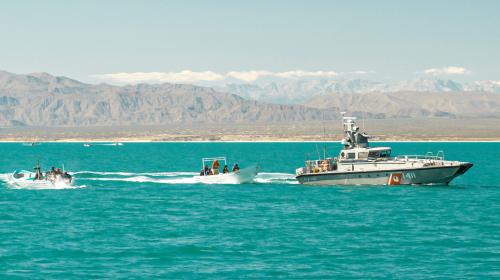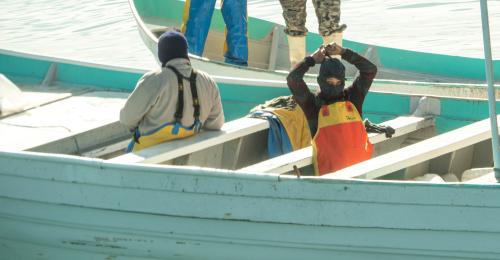There’s little to celebrate this International Save the Vaquita Day (July 24) — at last count, in 2019, only nine of the little porpoises endemic to Mexico’s Gulf of California were found, and things have only gotten worse since, both for the imperiled marine mammal and U.S.-Mexico relations. Since 2020, the United States has levied costly seafood trade sanctions on Mexico for its lack of regulations comparable to the environmental protections American fishermen are required to observe. On July 9, the Andrés Manuel Lopez-Obrador administration further soured the situation, bungling the rollout of new rules meant to satisfy U.S. demands for improvement by confusingly signaling that strict enforcement action will be triggered only if poaching reaches critical levels.
The vaquita’s precipitous plunge toward extinction is the fastest on record, with numbers down 99% in less than a decade. This is not simply an environmental crisis, because it is linked to Mexican cartels which are growing bolder in San Felipe, a beach town favored by American vacationers 100 miles south of the border on the Upper Gulf of California. Two months ago six fishermen were gunned down in broad daylight, unprecedented coordinated assassinations linked to the sons of drug kingpin El Chapo and the Sinaloa cartel. No one has been arrested, and bilateral security cooperation to tackle the cartels remains largely frozen due to Mexico’s December 2020 security law that eviscerated meaningful cooperation in retaliation for the U.S. arrest of former Mexican Minister of Defense Salvador Cienfuegos on drug charges. If the U.S. takes action quickly to help Mexico get things right on the vaquita, progress could also be made not just on averting a species’ extinction but also on rebuilding the anti-crime partnership important for U.S. security.
The responsibility for fighting the cartels’ economic power is not Mexico’s alone: demand for drugs in the United States and wildlife products in China play key roles. China’s gourmands pay astronomically high prices to make a soup from the swim bladder of a rare Mexican fish — totoaba — found in the same area as the vaquita. Underwater net walls set to poach the fish have entangled and drowned hundreds of the air-breathing porpoises. Cartel elements were attracted by the hefty profits and lax enforcement of fishing regulations by Mexican authorities. According to field interviews, some totoaba poachers report that they are now compensated with bags of methamphetamine, spawning an addiction crisis and entrenching cartel influence.
The enforcement task is clear and concrete: Mexico needs to secure a population of fewer than 10 porpoises located 10 miles offshore and threatened by approximately 100 poaching skiffs operating in an area of 100 square miles. This is hardly mission impossible.
The U.S has a vested interest in helping Mexico succeed, and should use carrots as well as sticks. Ramping up rapid removal of illegal fishing nets is the most urgent priority. The U.S. can provide funding and technical resources (like net-detecting sonar equipment), advancing the 2016 promise of the Obama-Biden administration that “both countries will establish and implement a long-term program to remove and permanently dispose of illegal and derelict fishing gear from vaquita habitat.”
The coronavirus pandemic has clearly demonstrated the risks of ignoring China’s esoteric taste for exotic endangered wildlife, and cartel involvement in totoaba trafficking (routes to China often pass through the U.S.) are added incentive for urgent action. This ugly business could be significantly reduced in 2021 if the U.S. treats it as a priority for enforcement cooperation with both Mexico and China. Key traffickers could be arrested on the basis of intelligence gained from Mexico’s May 1 arrest of a Chinese man in the border city of Mexicali with $10 million worth of swim bladders stashed in his luxury mansion.
U.S. aid can scale up vaquita-safe fishing gear being used in pilot projects in the waters off San Felipe, so that seafood trade can be restored and community fishermen have a viable way to earn a living — American consumers are willing to pay top dollar for certified sustainable jumbo shrimp. And the work of Mexico’s vaquita scientists should be supported so they can conduct a new population survey as soon as possible, and tell us whether there is hope after all.








Commentary
A porpoise to serve: Rescuing the vaquita and the US-Mexico relationship
July 26, 2021